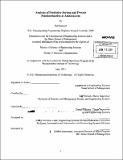Analysis of predictive sorting and process standardization at Amazon.com
Author(s)
Jackson, Rob (Jeffrey Robert)
DownloadFull printable version (8.135Mb)
Other Contributors
Leaders for Global Operations Program.
Advisor
Roy Welsch and Daniel Whitney.
Terms of use
Metadata
Show full item recordAbstract
In any process, complexity has the potential to decrease processing rates of the operation. Mass production has driven up operator efficiency by removing complexity to create a standardized and simplified process. However, removing complexity from a process reduces the operator's ability to customize their products and remain flexible to variations in demand. Businesses need to decide the appropriate level of process standardization that allows their operators to work as efficiently as possible while remaining flexible enough to satisfy customer demand. The goal of this research is to analyze the standardization of the least efficient process in an outbound order fulfillment system at Amazon.com. Various tests were performed during a six-month internship at Amazon's Lexington, KY facility to determine if this process could benefit from standardization. The testing showed that Amazon's processes must maintain a high level of flexibility to satisfy the variations in customer demand and the diverse mix of products that they ship. This research ends with a proposed process improvement that will improve the efficiency of the baseline scenario while providing flexibility to handle variation in order flow. During the internship, the per-order cycle time at the packing operation has been reduced by 9.7% and another improvement was tested which reduced cycle times by 10.9% when implemented. When the final improvement is implemented the total cycle time reduction will be 20.6%.
Description
Thesis (M.B.A.)--Massachusetts Institute of Technology, Sloan School of Management; and, (S.M.)--Massachusetts Institute of Technology, Engineering Systems Division; in conjunction with the Leaders for Global Operations Program at MIT, 2011. Cataloged from PDF version of thesis. Includes bibliographical references (p. 43-44).
Date issued
2011Department
Leaders for Global Operations Program at MIT; Massachusetts Institute of Technology. Engineering Systems Division; Sloan School of ManagementPublisher
Massachusetts Institute of Technology
Keywords
Sloan School of Management., Engineering Systems Division., Leaders for Global Operations Program.